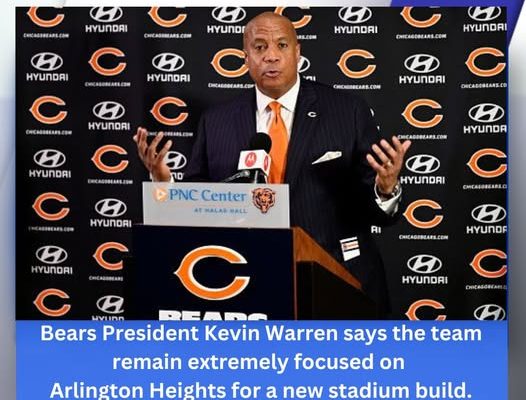**At a news conference Friday, Chicago Bears president Kevin Warren stated that the team is remaining focused on Arlington Heights.** This declaration comes amid ongoing speculation about the franchise’s future stadium plans, as the Bears continue to explore options for a state-of-the-art facility to replace Soldier Field. Warren’s comments reaffirm the organization’s commitment to Arlington Heights as the preferred location for a potential new stadium, despite recent negotiations with the city of Chicago and other municipalities vying to host the team.
The Bears’ pursuit of a new stadium has been a major storyline over the past two years, with the team purchasing the 326-acre Arlington International Racecourse property in 2021 for $197.2 million. The site, once home to a renowned horse racing track, presents a prime opportunity for the Bears to develop a modern stadium, entertainment district, and commercial hub. However, progress has been slow due to tax disputes, local opposition, and competing offers from Chicago and other suburbs.
Warren emphasized that while the Bears are still open to discussions with Chicago and other interested parties, Arlington Heights remains the priority. “We’ve invested significant time and resources into the Arlington Heights project because we believe it’s the best long-term solution for our team and our fans,” Warren said. “The potential for a transformative development in that location is unmatched, but we also understand that these deals are complex and require collaboration with local governments and stakeholders.”
One of the biggest hurdles in the Arlington Heights plan has been the property tax assessment. Local officials initially valued the land at a much higher rate than the Bears anticipated, leading to a stalemate in negotiations. Cook County’s property tax system has been a point of contention, with the team arguing that the assessment should reflect the property’s current use as vacant land rather than its potential future value as a stadium site. Warren acknowledged these challenges but expressed optimism that a resolution could be reached.
Meanwhile, the city of Chicago has not given up on keeping the Bears within its limits. Mayor Brandon Johnson’s administration has reportedly presented new proposals to renovate Soldier Field or explore alternative stadium sites, including the possibility of a domed facility near McCormick Place. The city’s pitch includes financial incentives and infrastructure improvements, but Warren’s latest remarks suggest the Bears remain unconvinced. “We have a great respect for the city and our history at Soldier Field, but we have to consider what’s best for the franchise’s future,” Warren said.
The Bears’ potential move to Arlington Heights has sparked mixed reactions among fans and analysts. Proponents argue that a new stadium in the suburbs would provide better tailgating opportunities, increased revenue streams, and a more modern fan experience. Critics, however, worry about the logistical challenges for fans relying on public transportation and the potential erosion of the team’s historic connection to Chicago. Additionally, some Arlington Heights residents have voiced concerns about increased traffic, noise, and taxpayer burdens.
Warren addressed these concerns during the press conference, stating that the Bears are committed to being “good neighbors” and ensuring that any development benefits the surrounding community. He highlighted potential economic advantages, including job creation, tourism, and local business growth. “This isn’t just about building a stadium—it’s about creating a year-round destination that uplifts the entire region,” he said.
The financial aspect of the project remains a critical factor. Stadium construction costs have skyrocketed in recent years, with new NFL venues like the Las Vegas Allegiant Stadium and Los Angeles SoFi Stadium exceeding $2 billion. The Bears have not disclosed exact figures but have indicated they are seeking public-private partnerships to share the financial burden. Illinois state lawmakers have yet to commit to any major funding, and Warren’s comments suggest the team is prepared to move forward only if the terms are favorable.
As the Bears navigate these complexities, the NFL is closely monitoring the situation. League officials have encouraged teams to explore new stadium opportunities to maximize revenue, but they also prefer stability and long-term planning. The Bears’ current lease at Soldier Field runs through 2033, but the team could exit earlier with financial penalties. Warren did not provide a definitive timeline for a decision but stressed that the organization is methodically evaluating all options.
For now, the message from the Bears’ leadership is clear: Arlington Heights is the goal, but nothing is set in stone. Warren’s press conference served as both a reassurance to fans and a signal to local governments that the team is serious about finding the right deal. “We’re going to continue working diligently with all parties involved to make this vision a reality,” he said. “Our fans deserve a world-class stadium, and we’re committed to delivering that.”
The coming months will be crucial in determining whether the Bears’ future lies in Arlington Heights or if another location emerges as a viable alternative. One thing is certain—the debate over the team’s stadium plans will remain a hot topic until a final decision is made. For a franchise with a storied history and a passionate fanbase, the stakes couldn’t be higher.



